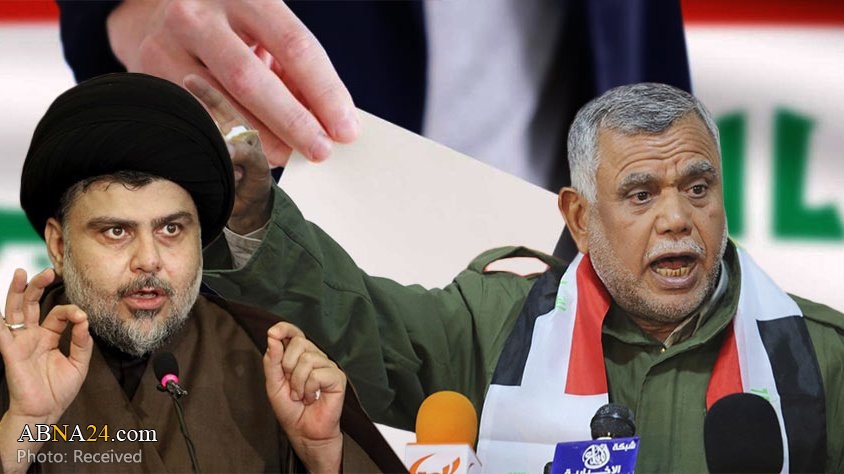(AhlulBayt News Agency) - Four days after the parliamentary election in Iraq, the partial results of the votes in the 18 provinces are being announced by the Independent High Election Commission.
The initial outcome shows that the Saeroon Coalition led by Sayyed Muqtada al-Sadr is leading with 54 seats, followed by the Fatah Coalition led by Hadi al-Amiri with 47 seats. The incumbent Prime Minister Haider al-Abadi's Nasr Coalition has come third as it harvested 42 seats in the Council of Representatives of Iraq. These front-runners have won their seats to lead a 328-seat parliament.
In addition to these three leading lists, others like State of Law Coalition (25 seats), Kurdistan Democratic Party (23), and Al-Wataniya List (21) are the key political players that are going to form the new parliament delivered by the first election since the emergence of ISIS terrorist group in the country.
These are not the final results, but any dramatic change of the initial results is hardly thinkable, or at best any party can see a change of its harvest by at most two seats.
The conclusion of the fourth parliamentary election of Iraq allows the premise that an anti-American front has won the votes of a majority of the Iraqi people. Over the past months, the analysts predicted that al-Abadi’s Nasr list will win overwhelmingly mainly influenced by the big defeat in 2017 of the ISIS, which has been holding large swaths of the country’s territory since 2014. But the domination of the Saeroon and Fatah lists as the largest and most important anti-American political blocs sends a strong message to the Americans.
Analysts assert that the Iraqi people have made their voice heard locally and regionally, saying by ballot that they are roundly opposing the US presence and flagrant intervention in their political affairs. Al-Sadr and Al-Amiri are both political elites who over long years of their political life very brazenly spoke up against the US meddling both in the affairs of Iraq and in West Asia region. Even when the nation was combating the ISIS terrorists in more than one front, they called for immediate and unconditional withdrawal of US forces from the war-torn country, warning that, they directly target the US military bases in the country. Washington sent forces to Iraq under the guise of fighting terrorism in the country.
The US and allies have limits influencing Iraq’s new government formation
The victory of anti-American forces in Iraq has consequences for Washington. One certain ramification of the Al-Sadr and Al-Amiri’s win is that the US will face tighter restrictions to sway the nation’s political course, especially when it comes to forming a government. The central point of slogans of Saeroon and Fatah coalitions in over a month of campaigning was preserving Iraq's independence and sovereignty and putting into practice socio-economic reforms. Their win has come as a surprise to the analysts, but it revealed that the majority of the Iraqis are not happy with Americans presence in their country.
In the coming weeks and perhaps months, as the state seeks to form a cabinet, the Americans are expected to do their best to impact the next developments and government formation process. But their power to play a role will be very limited as Iraq head to its future. So, under the new conditions, the Iraqi politicians should exercise utmost caution in their relationship with Washington as this is a demand sent to them by the public via the polls.
Anti-American camp’s power gain after 2003
To shed light on the reasons of the triumph of the anti-American lists in the May 12 election, the course of evolution of anti-Washington sentiments in the Iraqi society after the toppling of Saddam Hussain in 2003 should be brought to spotlight. Large part of Iraqi nation was optimistic about the US-led invasion to topple former dictator Saddam and this positive sentiment motivated a large part of the nation’s political body to set up warm relations with Washington. However, despite that openness to the Americans, Al-Sadr formed Jaysh al-Mahdi militia and led an armed revolt against the American occupation of the country. The militia group fiercely hit the American, as well as the allied British, military posts in Basra and Baghdad as he labeled the American forces in Iraq “illegitimate and destabilizing” and called on them to immediately leave the country. The armed struggle against Washington was heated enough to allow the CIA to several times from 2005 to 2007 attempt to assassinate the influential cleric. All attempts were unsuccessful, however.
Hadi al-Amiri, the head of the Badr Organization, was another key opponent of the US presence in Iraq. As an independent Shiite figure, he since the beginning, strongly came against the US military presence in Iraq. Even after 2010 when Al-Amiri served as a Member of Parliament and minister of transportation, he was widely recognized as anti-American with antipathy to Washington meddling in home affairs.
They two also helped form the Popular Mobilization Forces (PMF), a force established to battle ISIS which wrested large tracts of Iraqi soil upon its rise. Through their contribution to PMF, the two leaders played a big role in the defeat of ISIS. During this period too, they solidly held their anti-American postures, asking the Americans to leave the country and remove all of their military bases in Iraq.
Iraq's parliamentary elections revealed that the Iraqi people consider the anti-Washington approach of the two political coalitions a right choice. With their vote to Al-Sadr and Al-Amiri, who confronted the US while other parties dealt with it moderately, the Iraqis continued to say no to more American interference in their country.
/129

